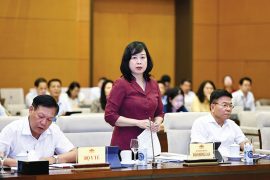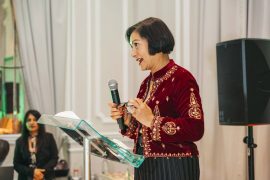By Miracle Nwankwo
“Meeting the hygiene needs of all adolescent girls is a fundamental issue of human rights, dignity, and public health,” says Sanjay Wijesekera, former UNICEF Chief of Water, Sanitation and Hygiene.
Menstrual hygiene seems to be a difficult experience for most women and young girls in rural areas of developing regions. Although the problem persists, we must not lose strength in our pursuit of promoting menstrual equity which is key to achieving women empowerment. As such, the world should work towards ending period poverty and guaranteeing access to portable water and sanitation for all by 2030.
Period poverty is the lack of access to sanitary products, menstrual hygiene education, toilets, hand washing facilities, and, or, waste management.
While enormous efforts are ongoing in different parts of the world to help women and young girls maintain a proper and hygienic menstrual lifestyle, Lolo Cynthia, a public health specialist and sexuality health educator, gathered 250 girls in southwest Nigeria last August with the aim of tackling period poverty with reusable pads.
Last summer Cynthia spent the break training and educating 250 girls on how to sew their own reusable menstrual pads from linens and cloth.
The initiative which was fully funded by the first lady of Nigeria’s Ondo state, Betty Anyanwu-Akeredolu, ensured that each girl went home with two washable pads and materials to make more reusable menstrual pads.
Cynthia’s period pad initiative also involved straight talk about sexual health which is not so common among teenage girls and in a country like Nigeria where discussions around menstruation and sexual health are often seen as a taboo.
According to a study conducted in three Nigerian states by the United Nations Children’s Fund (UNICEF), a large percentage of teenage girls “believed that menstruation was a secret and unclean experience.” While menstruating, they experienced anxiety, abdominal pain and cramps, nausea and vomiting, dizziness and a loss of appetite.
The scarcity of menstruation and sexual health education among Nigeria female children is not the only present problem to tackle. Another major issue is the high cost of sanitary pads. In a country like Nigeria where an estimated 44 percent of its population (87 million people) live in extreme poverty, earning less than $1.90 per day, menstrual products are heavily taxed and a pack of sanitary pads costs an average of $1.30.
“Lolo’s eco-friendly pad is a viable business that should be replicated across Nigeria,” says Oritseweyinmi Erikowa-Orighoye, a friend of Cynthia’s and project manager at the Coastal and Marine Areas Development Initiative. “If women learn how to make reusable sanitary pads, they can also use it as a means of livelihood, turning it into a wealth-creation avenue.” Indeed, women in Ondo have already started to make money since the training.
While this seems like a lasting solution to ending period poverty in Nigeria, Cynthia faces a lot of challenges in getting the people to embrace the innovation. Challenges like cultural beliefs around sex to raising funds and making contacts to penetrating certain corners of society.
Another challenge was getting funds for the project. “Most times I reach out to people to donate for projects, and we haven’t been able to get proper grants and sponsors,” Cynthia says.
When she realized that she could not get enough money for the project she entered a partnership with the Ondo state first lady and Dolapo Olaniyan, executive director of the Gender Equality and Empowerment Network, which helped to kick of the project.
Dealing with period poverty amongst Nigerian women is a concern to Cynthia who understands the everyday struggles of single women in the country. “As a woman, when you grow up in Nigeria, you would see so many things that are unacceptable and you would see real big issues that affect every single woman,” Cynthia says. “We sometimes look at it as a conversation that does not matter and prefer talking about the economy, so I decided to do something about it.”
The journey to ending period poverty began during her study days in South Africa. She encountered some girls complaining of the high cost of sanitary pads. When she returned to Nigeria, she took what she calls a triple-A approach to period poverty — access, awareness and affordability which started with the NoDayOff Campaign, distributing over a thousand disposable menstrual pads to women and girls in her local community of Festac Town.
Her work soon earned recognition, from the UN Refugee Agency to the “New Establishment List” by Nigerian news outlet YNaija to the continent-wide “Social Good Awards.”
About Cynthia
Lolo Cynthia was born and raised in Lagos, Nigeria. She relocated to South Africa in 2009 for post-high school studies. At the age of nineteen she earned two degrees from public health and sciences and HIV-AIDS and health management, at Monash University.
She started out in the media, performing on a TV screen test in 2017. She also shuttled between the media and a medical social job with an assisted living facility in Lagos. Afterwards she joined Nigeria’s Rave TV as a broadcaster on a live breakfast show about current affairs, politics and lifestyle. She also produced an ongoing documentary series called Stories Unheard, focusing on the lives of street children, abuse of anti-malaria medication and other issues that affect women in Nigeria.
Currently, Cynthia works as a consultant to help fund her initiative. She scouts for more donations and sponsors to help the initiative survive. She looks to a future of nothing less than a nationwide behavioural and mental shift to women menstrual health. She is also working on a sexuality education syllabus for schoolchildren across the country.
She also pursues a long-term partnership with Nigeria’s Federal Ministry of Health and Education to establish a system that ensures access to six reusable pads to each female student every new school year.





Comments are closed.